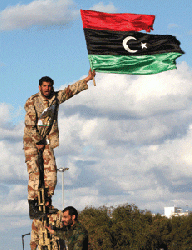Stability still evades Libya as heavily-armed militias run rampant one year after protests began to oust dictator Muammar Gaddafi and install democracy in the north African state.

|
| A member of the National Transitional Council forces wave the Libyan flag as they parade along a main street in Tripoli February 14, 2012. Friday marks the first anniversary of the revolution. REUTERS/Ismail Zitouny |
The militias spearheaded the rebellion that ended Gaddafi’s 42-year rule, but they have so far refused to disband. With their heavily armed units patrolling the streets, they have more power on the ground than Libya’s official rulers.
Amnesty International said in a report that its researchers had documented dozens of cases of militias committing war crimes, torturing detainees, and forcing whole communities to flee their homes.
It said Libya’s interim leadership, the National Transitional Council (NTC), had to date failed to assert its authority over the militias by investigating the abuses.
“Militias in Libya are largely out of control and the blanket impunity they enjoy only encourages further abuses and perpetuates instability and insecurity,” said Amnesty’s Donatella Rovera.
“A year ago Libyans risked their lives to demand justice. Today their hopes are being jeopardized by lawless armed militias who trample human rights with impunity.”
“It is imperative that the Libyan authorities firmly demonstrate their commitment to turning the page on decades of systematic violations by reining in the militias,” Rovera said in a statement.
The NTC’s ability to deal with the militias is limited because, as an unelected caretaker administration still trying to build a national police force and army, it is too weak to try to crack down.
Western intervention, including a NATO bombing campaign, brought an influx of weapons to rogue militias, ensuring the country remained unstable post-Gaddafi, while touting the flag of freedom and democracy.
Oil reserves in Libya are the largest in Africa, and have attracted particular interest from Western powers.
In an interview with Reuters over the weekend, NTC chairman Mustafa Abdel Jalil said a program to integrate the militias into national security forces was making progress, though it was taking longer than planned.
Abdel Jalil also said that a committee had been set up to investigate reports that militias were torturing detainees, and that communities forced from their homes by the militias would be allowed to return home eventually.
In its report, Amnesty said it had collected evidence of widespread torture in militia-run detention centers. It said in one case its researcher witnessed armed militia members kicking an older detainee as he crouched against a wall.
The report said at least 12 detainees died from abuse since September last year. Their bodies were covered in bruises and some had their fingernails pulled out, it said.
Amnesty said dark-skinned Libyans and immigrants from sub-Saharan Africa were targeted by militia men because they were suspected of having fought for Gaddafi during the conflict.
The mostly dark-skinned residents of Tawerhga, east of Tripoli, had to flee their homes when militias from the nearby city of Misrata swept in. They were seeking revenge for what they perceived as Tawerhga’s support for Gaddafi.
But Mokhtar al-Akhdar, a militia commander of a 1,200-strong force drawn mainly from Zintan, which now controls Tripoli airport, told reporters on Wednesday evening that the NTC had failed to provide jobs and security.
Al-Akhdar said rebels have been working without pay to secure the country, making it difficult for the militias to give up their guns.
If a police force of at least 10,000 men is deployed, they would consider giving up their own weapons, Akhdar said, complaining about a recent incident in which members of his militia had been detained by a rival group in Benghazi in an apparent response for a previous clash.
Such altercations have become a daily occurrence in Libya.
— Reuters, Al-Akhbar






Leave a Reply